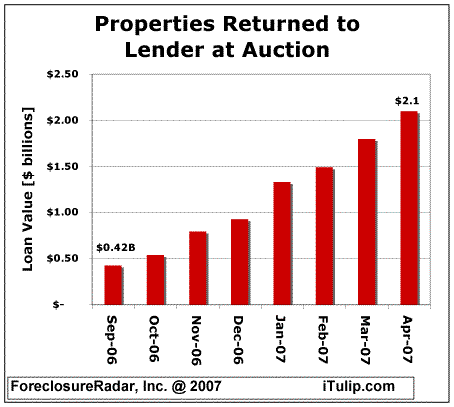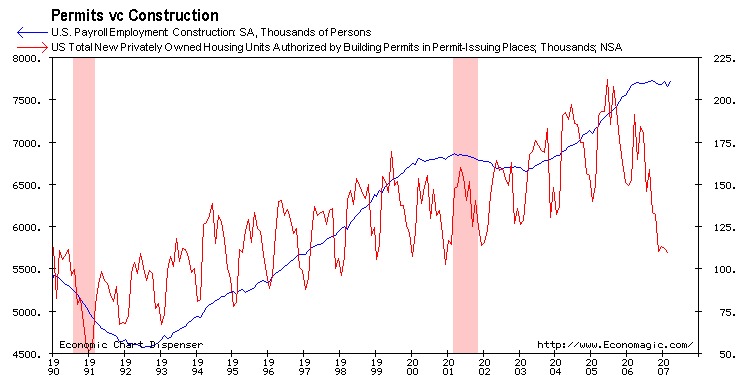Housing Bubble Aftermath: Bird's Eye View
May 3, 2007 (iTulip.com)
Today in this exclusive interview with ForeclosureRadar CEO and iTulip real estate expert Sean O'Toole, iTulip's Eric Janszen gets the details on the housing bubble downturn in California. In this ten minute video, Sean describes the "zillow.com" of web based foreclosure data services. Foreclosureradar.com offers sophisticated visual tools, including a heat map that shows degrees of foreclosure activity by zip code and pin point details on properties in the foreclosure process in all 58 California counties, updated daily.
According to ForeclosureRadar's proprietary data, the loan value of properties returned to lender at auction in CA has increased from $420 million per month in September 2006 to over $2 billion in the month of April 2007. Behind these stunning numbers are real people in real homes.
If you live in California, or have family or friends who do, foreclosureradar.com will show you foreclosure activity in the area. A home in foreclosure often looks like any other home. You may be surprised by the level of foreclosure activity in your own neighborhood.
The service is designed for real estate professionals who are looking for up-to-date and accurate information on foreclosed properties to buy. Non-professionals can use the service to locate the nearest 20 properties in the center of an entered zip code region for free. Subscribers will see all of the properties in foreclosure in the zip code area they select. They will also see data on home equity, title status, and other relevant details, all up-to-date.
iTulip is offering a 50% discount on the $49.95 subscription fee until May 10, 2007 for its members. Go to the subscription page an enter the Source Code: iTulip.
Link to the video: http://www.youtube.com/watch?v=QE7fC0aXea4
See also, iTulip interview with James Scurlock, creator of "Maxed Out: Hard times, easy credit, and the era of predatory lenders."
May 3, 2007 (iTulip.com)
Today in this exclusive interview with ForeclosureRadar CEO and iTulip real estate expert Sean O'Toole, iTulip's Eric Janszen gets the details on the housing bubble downturn in California. In this ten minute video, Sean describes the "zillow.com" of web based foreclosure data services. Foreclosureradar.com offers sophisticated visual tools, including a heat map that shows degrees of foreclosure activity by zip code and pin point details on properties in the foreclosure process in all 58 California counties, updated daily.
 |
If you live in California, or have family or friends who do, foreclosureradar.com will show you foreclosure activity in the area. A home in foreclosure often looks like any other home. You may be surprised by the level of foreclosure activity in your own neighborhood.
The service is designed for real estate professionals who are looking for up-to-date and accurate information on foreclosed properties to buy. Non-professionals can use the service to locate the nearest 20 properties in the center of an entered zip code region for free. Subscribers will see all of the properties in foreclosure in the zip code area they select. They will also see data on home equity, title status, and other relevant details, all up-to-date.
iTulip is offering a 50% discount on the $49.95 subscription fee until May 10, 2007 for its members. Go to the subscription page an enter the Source Code: iTulip.
Link to the video: http://www.youtube.com/watch?v=QE7fC0aXea4
See also, iTulip interview with James Scurlock, creator of "Maxed Out: Hard times, easy credit, and the era of predatory lenders."

Comment